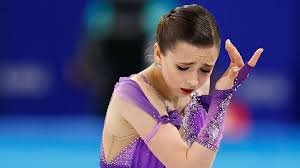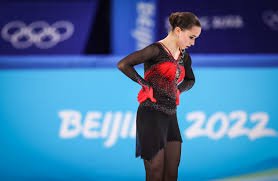
Russian figure skater Kamila Valieva placed fourth in the women’s figure skating final at the Beijing Winter Olympics on Thursday, capping off more than a week of controversy after the teen was cleared to skate despite testing positive for a banned substance.
Kamila Valieva: Cries| Falls| Hearing| Drug cocktail
Cries:
Kamila Valieva, 15, was inconsolable after tumbling during her free skate at the Winter Olympics in Beijing, China. The Russian teen, who was in first place but ended in fourth amid a doping scandal, had her head buried into the lap of the choreographer Daniil Gleikhengauz in the emotional photos taken on Thursday, Feb. 17.
Her coach Eteri Tutberidze also helped console her, gently placing an arm on her back as tears flowed down her cheeks. Valieva also placed her face in her hands as she continued to cry, hunched over. Up until the free skate, Kamila was favored to take the gold medal home to Russia.
Falls:
During the Feb. 17 competition, the 15-year-old shockingly fell twice — just days after breaking Olympic history as the first woman to ever complete difficult quadruple jumps. She ultimately ended fourth place with 224.09 points after earning 141.93 points for her free skate.
Kamila tested positive for banned heart substance trimetazidine along with two other, not-banned heart medications in a sample obtained by the Russian Anti-Doping Agency.
Hearing:

“The panel considered that preventing the athlete to compete at the Olympic Games would cause her irreparable harm in the circumstances,” CAS Director General Matthieu Reeb said in a statement to AP.
According to a court filing by Kamila’s lawyer, per USA Today, the trimetazidine belonged to her grandfather and she somehow ingested the drug.
Trimetazidine is used to increase blood flow to the heart in people with conditions like angina. Although the sample was collected on Christmas Day, the results were not reported publicly until Feb. 8 by the World Anti-Doping Agency lab in Sweden.
Drug Cocktail:
Valieva blamed her positive drug test on a mix-up that occurred with her grandfather’s medication, Denis Oswald, the Chair of the International Olympic Committee (IOC) Disciplinary Commission, told reporters Tuesday.
However, the results only came to light during the Olympics. Last week, the Court of Arbitration for Sport gave Valieva the green light to continue competing in the Games because of the exceptional circumstances of her being a minor.
